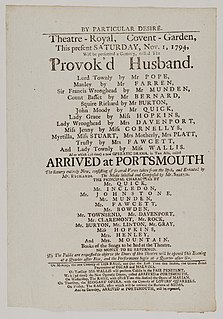Related Research Articles
The Fair Example, or the Modish Citizen is a 1703 comedy play by the English writer Richard Estcourt, originally staged at the Drury Lane Theatre. It was part of a growing trend of plays to feature a plot of an honest wife reforming her rakish husband along with Sir Harry Wildair, As You Find It, The Wife's Relief and The Modish Couple. It is a reworking of the 1693 French play Les Bourgeoises à la Mode by Florent Carton Dancourt. In 1705 a separate English adaptation of the French work John Vanbrugh's The Confederacy appeared at the rival Queen's Theatre in the Haymarket.
The Wife's Relief, or, The Husband's Cure is a 1711 comedy play by the British writer Charles Johnson. The plot revolves around a virtuous wife who tries to mend her husband's rakish ways.
The Play is the Plot is a 1718 comedy play by the British writer John Durant Breval.
The Refusal, Or, The Ladies Philosophy is a 1721 comedy play by the British writer Colley Cibber. It is a reworking of the 1672 farce Les Femmes Savantes by Molière, with reference to the recent South Sea Bubble.
Caesar in Egypt is a 1724 tragedy by the British writer Colley Cibber. It is inspired by Pierre Corneille's 1642 French play The Death of Pompey about Julius Caesar's intervention in the Egyptian Civil War between Cleopatra and her brother. Cibber also incorporated elements of Plutarch and John Fletcher's The False One. The Drury Lane company invested lots of resources to make it a particularly extravagant production in the traditional style of a Restoration heroic drama.
The Modish Couple is a 1732 comedy play by the British writer James Miller, under the pen name Charles Boaden. A virtuous wife reforms her rakish husband.
The Universal Gallant, or The Different Husbands is a 1735 comedy play by the British writer Henry Fielding.

The Provoked Husband is a 1728 comedy play by the British writer and actor Colley Cibber, based on a fragment of play written by John Vanbrugh. It is also known by the longer title The Provok'd Husband: or, a Journey to London.
The Masquerade is a 1719 comedy play by the British writer Charles Johnson.
The Universal Passion is a 1737 comedy play by the British writer James Miller. It is a reworking of Shakespeare's Much Ado About Nothing.

The Humours of Oxford is a 1730 comedy play by the British writer James Miller. It was Miller's debut play, inspired by his time at Wadham College, and proved popular. The plot is set around Oxford University and portrays the academics as overindulging in port wine. William Hogarth designed the frontispiece of the published version of the play.
Love in a Riddle is a 1729 ballad opera by the British actor-manager Colley Cibber. It was part of a boom in ballad operas inspired by the enormous success of John Gay's The Beggar's Opera the previous year.
The Impertinent Lovers is a 1723 comedy play by the British writer Francis Hawling.
Timoleon is a 1730 tragedy by the British writer Benjamin Martyn. It is based on the life of the Greek statesman Timoleon, leader of Syracuse during the Sicilian Wars against Carthage.
Bayes's Opera is a 1730 ballad opera by the British writer Gabriel Odingsells. It was part of a boom in ballad operas that followed in the wake of the susccess of John Gay's The Beggar's Opera.
Love in a Forest is a 1723 comedy play by Charles Johnson. It is a substantial reworking of Shakespeare's As You Like It cutting out characters and passages, while borrowing from other Shakespeare plays amongst other things.
Hecuba is a 1726 tragedy by the British writer Richard West. It is named after Hecuba a figure in Greek Mythology from the time of the Trojan War.
Zara is a 1736 tragedy by the British writer Aaron Hill, based on the 1732 French play Zaïre by Voltaire.
The Fine Lady's Airs is a 1708 comedy play by the British writer Thomas Baker.
The Non-Juror is a 1717 comedy play by the British writer Colley Cibber. It is inspired by Molière's 1664 work Tartuffe.